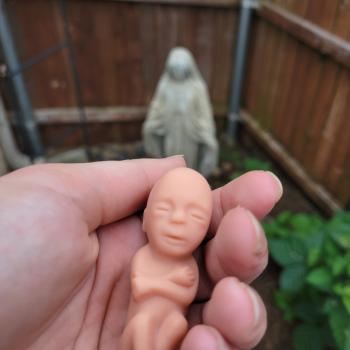If this were the case, God's words take on a different meaning. When God speaks of a test for Abraham, the real test is: Will Abraham, a convert to monotheism in a largely pagan world, succumb to the terrible practice of his culture or will he listen to and trust in Jehovah? Has Abraham grown enough in his knowledge of his God to know that Jehovah is not like "the god of Elkenah, and the god of Libnah, and the god of Mahmackrah, and the god of Korash"? (Abraham 1:6) In this reading, the repetition reminding Abraham of his love for Isaac, "take thy son, thy only son, whom thou lovest" is God seeing into Abraham's heart, anticipating this temptation and confusion, and counseling Abraham to consider parental love. Remember, Abraham, the sorrow you felt at the loss of Ishmael. You have only one son left, think of your love for him. Perhaps sending Abraham to Mount Moriah, a three-day trek away, is a tender mercy of God giving Abraham time with Isaac and a chance to reconsider what he is planning to do.
Abraham packs his bags and takes Isaac and two servants and they travel to the appointed place. Readers can assume the internal conflict that Abraham experiences but underscoring it is the repeated description of father and son walking alone together to the mount. As Abraham reaches to kill his son, he hears the voice of the angel and stays his hand. Ultimately, the miracle of the story is that Abraham, in this terribly emotional moment, listens to the voice of the angel. Through divine aid, Abraham breaks with the pagan practice of sacrificial worship, breaks with the demons that plague him from his past, and lets his love for his son and his love for his God work together to help him make better choices and be a better man.
The angel's words to Abraham on Mount Moriah require a very close reading and a suspension of our traditional assumptions about their meaning. Significantly, the angel speaks twice, with slightly different wording the second time. Just as Abraham is at the point of killing Isaac, the angel says, "Abraham, Abraham . . . . Lay not thine hand upon the lad, neither do thou any thing unto him: for now I know that thou fearest God, seeing thou has not withheld thy son, thine only son from me" (Gen. 22:11-12). A few verses later, the angel repeats himself, saying, "By myself have I sworn, saith the Lord, for because thou has done this thing, and hast not withheld thy son, thine only son" (22:16). Any repetition in heavenly speech requires careful observation. The difference between the first and second statement is primarily the phrase "because thou hast done this thing." While traditionally assumed to reference Abraham's near-sacrifice of Isaac, the phrase actually follows verses 13-14, where Abraham replaces the child sacrifice with the sacrifice of the "ram caught in a thicket" and dedicates the land as "Jehovah-jireh: . . . In the mount of the Lord it shall be seen." Therefore, "because thou has done this thing" seems to refer to Abraham's actions in sacrificing an animal instead of his child.
The next phrase from the angel also requires strict scrutiny: "Because thou hast not withheld thy son, thine only son" (22:16). Traditionally, we assume that the words of the angel describe death, that Abraham was willing to sacrifice even his son's life on the altar for his God. I believe it is possible to interpret these verses differently. If "because you have done this thing" refers to Abraham's substitution of an animal sacrifice in place of a child sacrifice, "[thou] has not withheld thy son" could refer to the fact that Abraham did not kill Isaac, which would have prevented Isaac from entering into covenants and fulfilling his preordained calling. From the perspective of God, doesn't Isaac's life hold more value as a patriarch of Israel rather than as a human sacrifice? We may return to God through death, but we can also return to Him through a consecrated life. In this understanding, Abraham's sacrifice of Isaac would have withheld Isaac from God by interrupting God's plans for a lineage of covenantal people.
The angel continues, "That in blessing I will bless thee, and in multiplying I will multiply thy seed as the stars of heaven, and as the sand which is upon the sea shore" (v. 17). This is not a reward for obedience, but a natural consequence: because Isaac lived, Abraham will have the posterity God previously promised. The blessing continues, "And in thy seed shall all the nations of the earth be blessed; because thou hast obeyed my voice." Not a voice which called for murder, but a voice that called for peace: the angel who called out to Abraham to stay his hand, figuratively smash the idols of his past, and preserve the covenant he has already made with God.
This version of the Akedah turns Abraham from a disturbing character into an empathetic one. Particularly in his misplaced efforts to serve God, I am reminded of my own confusion about what God wants from me at times. Spencer W. Kimball's son wrote about his father's removal of the temple and priesthood ban for those of African descent as a spiritual journey in which President Kimball did not always know the will of God. While President Kimball believed the change to be right, he worried that he was imposing his own desires and mistaking them for God's. (See Edward L. Kimball, "Spencer W. Kimball and the Revelation on the Priesthood," BYU Studies Vol. 47: 2 [2008].) Even prophets may struggle with interpreting the divine. I believe that Abraham's ability to listen to the angel (which I hear as a still, small voice rather than a visionary burst) in a moment when he had already determined what he would do, showcases his spiritual capacity.
This is still a story of sacrifice. However, in this interpretation, Abraham's sacrifice comes not from the potential sacrifice of his son, but from his actual sacrifice in giving up his prejudices about the nature of divinity, his father's damaging legacy, and the cycle of abuse and violence. He gives these things up to a God who replaces them with gifts that are much greater: lineage, love, and a relationship with the divine.




